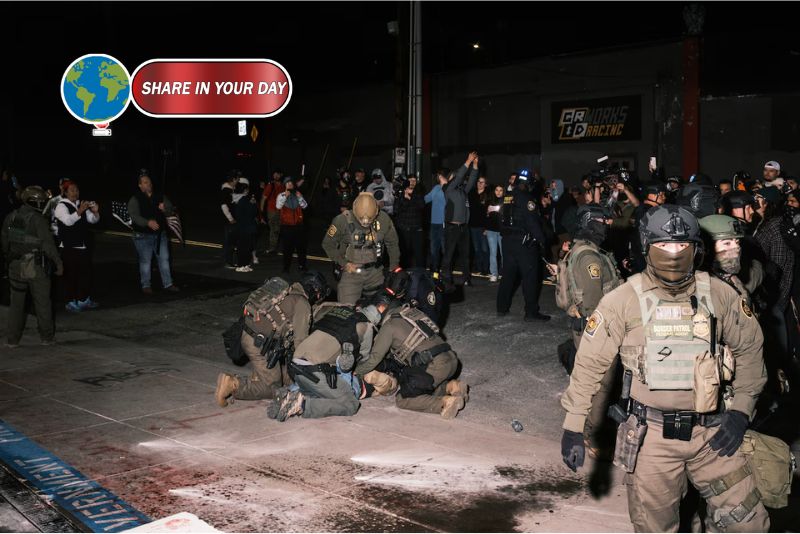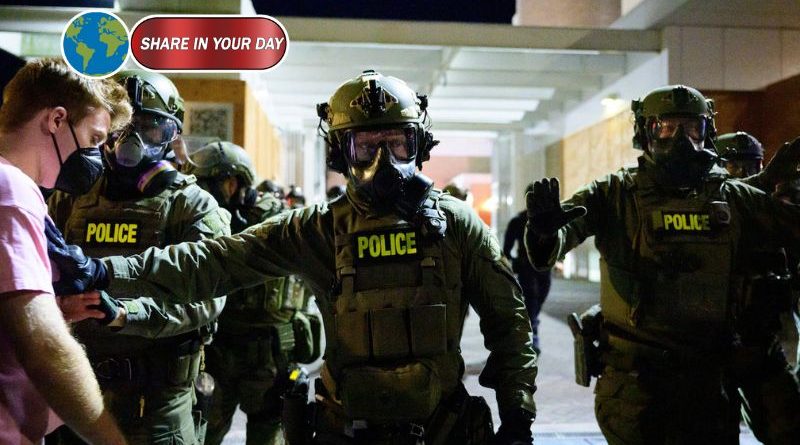Trump Can Deploy Troops to Portland, Appeals Court Rules in Controversial Decision
Washington, D.C. — A sharply divided federal appeals court has ruled that former President Donald Trump acted within his authority when he sought to deploy federalized National Guard troops to Portland, Oregon, reversing a prior court order that blocked the move.
The U.S. Court of Appeals for the 9th Circuit issued its ruling Monday, determining that Trump’s attempted deployment in response to prolonged protests outside an Immigration and Customs Enforcement (ICE) facility likely complied with federal law. The decision marks a significant legal victory for the Trump administration in its ongoing effort to assert expansive executive powers during periods of civil unrest.

Appeals Court Overturns Trump-Appointed Judge’s Block
The ruling overturns an earlier decision by U.S. District Judge Karin Immergut, who had blocked the administration from sending Oregon National Guard troops into Portland. Notably, Immergut herself was appointed by Trump during his presidency.
Immergut argued that the situation on the ground had de-escalated by the time the deployment was announced, and that “months had passed since there was any sustained level of violent or disruptive protest activity.”
But in a 2-1 decision, a panel of the 9th Circuit concluded that Immergut had “accorded no deference” to the president’s judgment and instead substituted her own reading of the facts.

Judges: Trump Acted Within Authority
Writing for the majority, Judges Ryan D. Nelson and Bridget S. Bade—both Trump appointees—stated that Trump’s decision to federalize the National Guard in late September was justified by a broader context of civil unrest, even if incidents in the immediate weeks prior had declined.
“The President can, and should, consider the totality of the circumstances when determining whether he ‘is unable with the regular forces to execute the laws of the United States,’” the judges wrote.
The panel faulted Immergut for focusing too narrowly on recent events and ignoring months of documented protest activity at the Portland ICE facility, which the Trump administration had cited as justification for deploying troops.
Dissent: Dangerous Expansion of Executive Power
In a blistering dissent, Judge Susan P. Graber, appointed by President Bill Clinton, warned that the ruling “erodes core constitutional principles” and risks granting future presidents unchecked authority to send troops into American cities.
“A pot of tepid water is not a pot of boiling water, and it cannot hurt you, even if it was boiling three hours earlier,” Graber wrote, questioning the logic of using summer unrest to justify a September deployment.
Graber also emphasized that the Trump administration had not yet challenged a second, still-active order that blocks the deployment of any National Guard troops to Oregon—not just the Oregon National Guard. Because of this, she said, Monday’s ruling has no immediate practical effect.
Background: Portland Protests and ICE Facility Violence
The legal battle stems from ongoing protests at a federal Immigration and Customs Enforcement (ICE) building in Portland, which began in mid-2020 and have continued sporadically through 2025.
While the Trump administration characterized the protests as violent and destructive, with attacks on federal property and personnel, state and city officials insisted that demonstrations had largely been peaceful for months, with isolated incidents.
In court filings, Oregon officials argued that Trump’s deployment infringed on the state’s sovereign right to manage its own National Guard and law enforcement operations.
“There had not been a single incident of protesters’ disrupting the execution of the laws in the weeks before Trump’s deployment,” Oregon Attorney General Dan Rayfield said in a statement following the ruling. “This decision, if upheld, sets a dangerous precedent.”
White House Praises Ruling; DOJ Seeks Further Action
The Trump administration hailed the ruling as a confirmation of executive authority.
“President Trump is exercising his lawful authority to protect federal assets and personnel following violent riots that local leaders have refused to address,” White House spokeswoman Abigail Jackson said in a statement.
The Justice Department quickly filed a motion to dissolve Judge Immergut’s second restraining order, which still prevents any National Guard troops—federalized or otherwise—from entering Oregon.
During oral arguments earlier this month, DOJ lawyer Eric McArthur argued that Immergut’s narrow focus on recent protest activity ignored a broader, longer-term threat to federal operations. He emphasized that regular federal law enforcement was being stretched too thin.
“This is not sustainable,” McArthur told the court. “That’s why the president took action.”
Oregon Fights Back, Warns of Federal Overreach
Oregon officials have pushed back strongly, framing the deployment as a violation of state autonomy and an unnecessary provocation in a city where tensions had largely subsided.
“We are not facing an emergency that justifies military deployment,” said Assistant Attorney General Stacy Chaffin, who represented Oregon during the hearing. “The facts simply do not support this intervention.”
Chaffin urged the court to evaluate the specific conditions present at the time of the deployment—not rely on months-old violence.
Next Steps: Possible En Banc Review by Full 9th Circuit
The case could now be reexamined by a larger group of 9th Circuit judges, known as an en banc panel, which would have the authority to overturn Monday’s ruling. Both the Trump administration and Oregon officials were instructed to file briefs this week stating whether they support further review.
Judge Graber, in her dissent, called on the full court to act quickly to prevent what she described as an “illegal deployment under false pretenses.”
“I urge my colleagues to act swiftly to vacate the majority’s order,” she wrote.
Broader Implications for Presidential Power
The ruling adds to a growing list of cases testing the boundaries of presidential authority to deploy troops domestically. A similar effort by Trump to send National Guard units to Chicago was blocked by a federal judge in Illinois, and the Supreme Court is expected to weigh in on that case imminently.
Legal scholars warn that the Portland decision—if allowed to stand—could embolden future administrations to circumvent state governments during times of political unrest.
“This case could redefine the balance of power between federal and state governments in law enforcement,” said Dr. Elena Worthington, a constitutional law professor at Georgetown University. “It opens the door to scenarios we haven’t seen in modern American history.”
Legal Fight Far from Over
While the 9th Circuit’s ruling clears a key hurdle for the Trump administration, the legal standoff is far from over. With another court order still in place and the potential for en banc review, the future of federal troop deployment to Portland remains uncertain.
As political divisions deepen over protest response and presidential authority, the case is now being closely watched as a potential landmark moment in the ongoing debate over the limits of federal power on U.S. soil.




